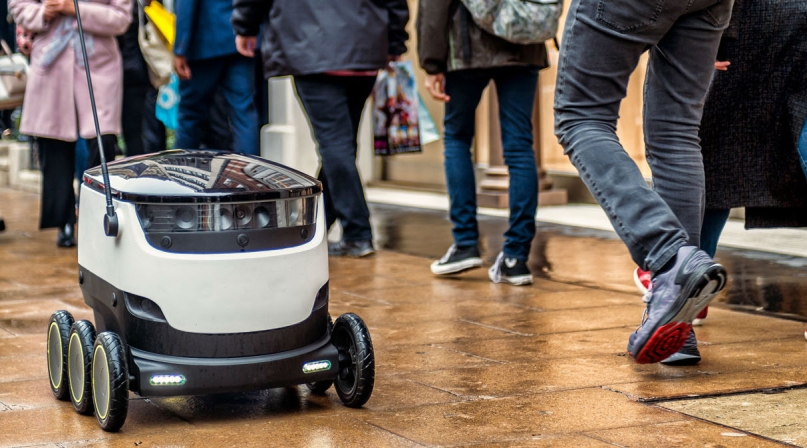Is a delivery robot coming to a sidewalk near you?

Counties debate right-of-way use, safety, privacy regarding regulation of delivery robots
Although flying drones have grabbed most of the headlines as the delivery service of the future, robots about the size of a beer cooler are beginning to roam sidewalks and cross streets in some urban areas, delivering everything from take-out tacos to office supplies to bouquets of flowers. Most of the deliveries are in test mode.
Some state and local lawmakers are exploring how to regulate these “last mile” delivery robots on their sidewalks and streets, as companies reach out to test the concept. Federal lawmakers are also interested in hearing more about how this new delivery service might impact their communities. On May 23, the House Subcommittee on Digital Commerce and Consumer Protection held a hearing on Capitol Hill dubbed “Disruptor Series: Delivering to Consumers,” looking at regulatory challenges that exist at the federal, state and local level to deploy the new service.
“There are potential winners and losers,” said Rep. Jan Schakowsky (D-Ill.), referring to the possibility of delivery drivers losing their jobs and people with tech skills possibly gaining jobs.
Schakowsky said she was also concerned about safety, noting that one of her staffers was recently startled by a delivery robot on the sidewalk, while walking in Washington, D.C., where a robot delivery pilot program is underway.
The robots typically are being managed remotely and are equipped with sensors, cameras and two-way audio. Customers usually gain access to their delivered goods using a code texted to them that unlocks a compartment on the robot.
Robot ban in San Francisco?
A ban on robots proposed earlier this month by Supervisor Norman Yee of the City and County of San Francisco is in stark contrast to the open-armed welcome by Virginia and Idaho state lawmakers, who have passed legislation, initiated by robot manufacturer Starship Technologies, allowing the robot deliveries.
Members of the San Francisco Board of Supervisors will consider Yee’s proposal in June.
“We met with different stakeholders and concluded that the best way to protect our public right-of-way is to prohibit the use of these automated delivery robots,” Yee said in a statement. “Our public spaces should not be commercialized.”
Yee said he is concerned about safety, especially for seniors, children and disabled people who might not be able to get out of a robot’s way. Companies say the robots have built-in sensors and would stop.
Privacy issues — the robots are loaded with cameras — the potential for people to lose delivery jobs and the possibility for a robot to be loaded with explosives were also concerns Yee has mentioned.
Dan Rogan, an attorney for the Hennepin County Board of Commissioners, said he foresees regulation of robot deliver ies mainly in urban areas.
“I think it would most likely be a city thing, not a county thing,” he said. “...the Legislature could weigh in as well.
Saying ‘yes’ to robots
In addition to Virginia and Idaho giving their OK for robot deliveries, Wisconsin lawmakers recently passed legislation that awaits Gov. Scott Walker’s signature, and two Florida lawmakers are also exploring legislation looking at regulating ’bots as well.
In Wisconsin, the legislation that passed allows robots to operate on sidewalks and crosswalks, sets an 80-pound limit on robots and a 10 MPH speed limit. A spokeswoman for the Wisconsin Counties Association said the group has not heard from its members on the issue.
In Virginia, delivery robots will be legal starting July 1.
Under the new law in Virginia, robots won’t be allowed to go any faster than 10 MPH or weigh more than 50 pounds and must stay in crosswalks when navigating streets.
Local governments may further regulate how robots operate in their jurisdictions if they want stricter measures, such as slower speed limits, timeframe restrictions or an outright ban.
County hoping for robot demo
“We are in a ‘wait and see’ mode,” said Pat Carroll, state liaison for Arlington County, Va., which counts several urban corridors that could be seen as ripe for robot deliveries.
Carroll said that the county Board members would like to arrange a demonstration of any robot delivery service before making any further decisions to tighten restrictions or ban them.
“I heard one of the robots in D.C. got surrounded by a big crowd on the sidewalk,” she said with a chuckle, referring to the pilot program in the nation’s capital that began in February.
Delivery robots will also become legal July 1 in Idaho. Like Virginia, Idaho’s county officials will also be able to further regulate or outright ban robots if they choose. Delivery robots can weigh up to 80 pounds in Idaho.
Rural counties, take note: Although most delivery robots are geared to urban areas, a Swiss company called Teleretail AG, according to TechCrunch.com, has developed a robot to cover longer distances of up to 50 miles.
Attachments
Related News

National Association of Counties Launches Initiative to Strengthen County Human Services Systems
The National Association of Counties (NACo) announces the launch of the Transforming Human Services Initiative, a new effort to help counties modernize benefits administration, integrate service delivery systems and strengthen county capacity to fulfill our responsibility as America’s safety net for children and families.


